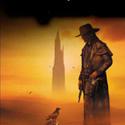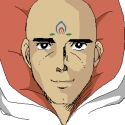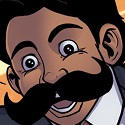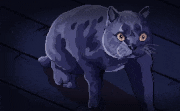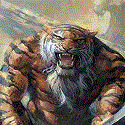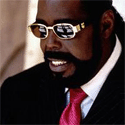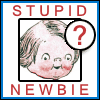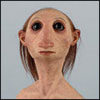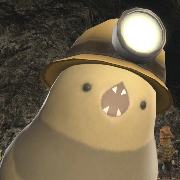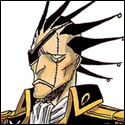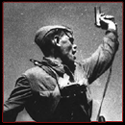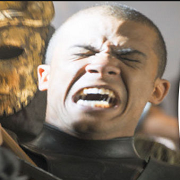|
What's the best starting point with Mieville? I've never read anything of his before, just heard praise about Bas-Lag. Should I start there or is his standalone work a better place to begin?
|
|
|
|

|
| # ? May 10, 2024 08:32 |
|
muike posted:Hey, I'm in the middle of Mote in God's Eye and I was hoping someone could clear something up for me. There's a whole bunch of weird stuff where the only female character talks about human gender relations and how she thinks very little of women who take birth control pills or whatever. Is this poo poo supposed to be just the way the culture of the Empire is, or are Pournelle and Niven just kinda weird old dudes? Pournelle is well known as a sexist shitheap. Look up the "12 rabid weasels of SFWA." He's one of them.
|
|
|
|
Stuporstar posted:Pournelle is well known as a sexist shitheap. Look up the "12 rabid weasels of SFWA." He's one of them. That's a shame. I guess it isn't though, since this book isn't doing a whole lot for me. The Gunslinger posted:What's the best starting point with Mieville? I've never read anything of his before, just heard praise about Bas-Lag. Should I start there or is his standalone work a better place to begin? You can start anywhere you want, really. None of his books are direct sequels to the others, even the Bas-Lag ones. My favorite is the Scar, but Perdido Street Station is loving fascinating in the world it's able to convey. Iron Council didn't do anything for me. It's not bas-lag, but The City and the City is very different from his usual prose in a way that it's almost like a different author, and I say that to mean he's rather versatile.
|
|
|
|
The Gunslinger posted:What's the best starting point with Mieville? I've never read anything of his before, just heard praise about Bas-Lag. Should I start there or is his standalone work a better place to begin? I agree with Muike, and I'd also add that my first Mieville was Kraken and that poo poo was amazing. Don't be afraid to just pick up Perdido Street Station and go crazy, though.
|
|
|
|
I started reading the Eisenhorn trilogy (Warhammer 40k stuff) which has a thread in this forum and so far its actually really good sci-fi/fantasy. I can pretty confidently recommend it, although I'm only halfway through the second book. Also, I want to pimp Emphyrio by Jack Vance one more time. It's the best thing I've ever read by Jack Vance, by a long shot. That alone should get some people interested. Stuporstar posted:Pournelle is well known as a sexist shitheap. Look up the "12 rabid weasels of SFWA." He's one of them. Haha a comment from one one of those: quote:DOCTOR POURNELLE IS A GREAT MAN I STAND WITH HIM IN HIS FIGHT AGAINST THE WOMEN WHO REFUSE TO HAVE SEX WITH ME WHICH IS ALL OF THEM EVEN THE NAZIS ALLOWED SOME MALE RELEASE NOW AND THEN I HAVE SEEN THOSE MOVIES Play fucked around with this message at 10:04 on Jul 13, 2013 |
|
|
|
The Gunslinger posted:What's the best starting point with Mieville? I'm going to get funny looks for this, but try Dial H. It's sublimely strange.
|
|
|
|
Here's a little excerpt for a new "Where to start with China Miéville?" feature I'm writing for the Miéville thread and/or my blog. I plan to do this for all of his novels, but here's a taste: ----- THE BAS-LAG BOOKS The Bas-Lag books are a series of three fantasy novels, each standalone, but all set within the world of Bas-Lag (and centering around the city-state New Crobuzon). Bas-Lag is not an Earth-substitute. It's a planet (or something else entirely? The Scar may have clues) with some weird (and often nightmarish) physics, and bursting with wildly different forms of magic and technology. It's not a steampunk world, so if anyone tells you it is, punch them in the face. Bas-Lag is populated by many sentient races including humans, Khepri (scarab-headed people), Garuda (bird people), Cactacae (physically imposing plant-people), Vodyanoi (bloated frog shamans), Hotchi (adorable hedgehog people), Grindylow (underwater nightmare fuckers), Llorgis (???), and many more. Humans may also come in Remade configurations, where machinery or non-human biology is grafted to them as a permanent punishment for a crime. There are three books so far in the Bas-Lag series: PERDIDO STREET STATION 2000 WHAT IT'S ABOUT - Isaac is a layabout scientist who lives with his Khepri girlfriend in New Crobuzon, a vast and ugly city populated by humans and many other species. He meets a Garuda from a far-off desert tribe whose wings have been cut off for a vaguely described crime, who commissions him to restore his flight by any means. In his research, Isaac accidentally unleashes an alien terror on the city and has to ally himself with dangerous forces to save the city. WHAT YOU'LL FIND INSIDE - psychic vampire moths, bug-headed women, birdmen, walking cacti, seditionist scientists and artists, mobsters who are more mosaic than man, hell's ambassadors, hive-mind machine intelligences, multidimensional spider gods, xenian sex, grime and filth READ THIS IF - you want to get in on the ground floor with Bas-Lag; you want the weirdest urban fantasy you've ever seen; you're sick of "it's medieval Europe!" fantasy worlds THE SCAR 2002 WHAT IT'S ABOUT - Bellis is a linguist who has fled the city New Crobuzon by ship, after the events of Perdido Street Station. Her ship is captured by scouts for the pirate nation Armada, a gigantic floating city made up of hundreds of ships of all kinds. Bellis is pressganged into citizenry of Armada, and soon finds herself on the periphery of a plan by the city's rulers to raise something ancient and unfathomable from the depths of the ocean. But that's only the beginning of a much more dangerous plan... WHAT YOU'LL FIND INSIDE - a city of stolen ships, pirates in pantaloons, libraries, an island of ravenous mosquito women, terrifying sea monsters, a voluntary Remaking, blood taxes, civil uprising, naval battles, parallel dimensions of possibility, a jackass of a dolphin, the word "puissance" a lot, pus READ THIS IF - you want to read the best of the best in fantasy; you love monsters; the ocean scares you; you thought Pirates of the Caribbean wasn't weird enough IRON COUNCIL 2004 WHAT IT'S ABOUT - Decades after Perdido Street Station and The Scar, New Crobuzon is at war with the witch-city Tesh. At the same time, civil unrest is brewing inside the city. Various factions make plans: one group plots to kill the corrupt mayor; another party journeys into the continent's uncharted heart to find the Iron Council — a renegade train, once owned by New Crobuzon but stolen by its workers, that lays its own rails and represents the last hope for the oppressed masses... that is, if it can make it home through the wilderness. WHAT YOU'LL FIND INSIDE - trains, golems, elementals, monsters galore, hedgehog men riding giant roosters, whores and railway workers starting revolutions, mysterious graffiti spirals, puppetry, a journey through a horrifying wasteland which is like a tumour on reality, telewitchcraft, assassination plots, war, gay sex READ THIS IF - you've already read Perdido Street Station; you wonder what a Cormac McCarthy fantasy novel would be like; you want Miéville at his most baroque and dense ----- STANDALONE NOVELS THE CITY & THE CITY 2009 WHAT IT'S ABOUT - Beszel, a crumbling city-state in Eastern Europe, has a rather unique relationship with its neighbour Ul Qoma (a bright, economic boomtown). The nature of that relationship becomes clear throughout the novel, but suffice to say it's more complicated than borders and politics. Remember, Miéville is a SF/F writer, after all. When a visiting archaeology student is murdered in one city but her body dumped in the other, the crime becomes much more than just another routine murder case. Inspector Borlú of Beszel has to deal with the shady forces that concern themselves with the relationship between the two cities. WHAT YOU'LL FIND INSIDE - murder, mystery, mindboggling geography, conspiracy theories, secret organisations, psychological SF, two well-crafted fictional European nations, characters with hard-to-pronounce names, Schroedinger's pedestrian READ THIS IF - you want to see what happens when you mash crime, sci-fi and literature together; most fantasy fiction isn't cerebral enough for you; you like to tax your brain with a good puzzle KRAKEN 2010 WHAT IT'S ABOUT - At the British Museum of Natural History, London, a 40-foot giant squid specimen has literally just vanished. This is only the start of a series of bizarre incidences which pull museum employee Billy into London's strange underworld of cults, magic, and other supernatural weirdness. And it may also be the start of the end of the world. WHAT YOU'LL FIND INSIDE - squids, tentacles, museums, bottles, cults, magic, witches obsessed with Star Trek, unionized familiars, ghost cops, human origami, indoor oceans, evil ink, cockney horrors, competing apocalypses READ THIS IF - you like Neil Gaiman; you want to try one of Miéville's darkest and funniest works; you want to know what the hell human origami is ----- Let me know if this interests you and I'll write up the rest of the books. Hedrigall fucked around with this message at 15:49 on Jul 13, 2013 |
|
|
|
The only mieville book I've read is Embassytown and i thought it was excellent so you could always do what I did and start with that.
|
|
|
|
I think you need to warn anyone starting mieville that they're going to find a lot of marxism in the mix.
|
|
|
|
Hieronymous Alloy posted:I think you need to warn anyone starting mieville that they're going to find a lot of marxism in the mix. Warn or entice? 
|
|
|
|
|
Hieronymous Alloy posted:I think you need to warn anyone starting mieville that they're going to find a lot of marxism in the mix. I didn't think so. It certainly doesn't paint capital in a flattering light, but none of it is prescriptive in the usual lovely "everything would be awesome if you chowderheads would vote my way (and by the way, the villain is Rob S. Pierre)" sci-fi. The organizers are portrayed as sympathetically as anybody in the book is....which is not very. So, by "a lot" you mean, "any, at all", and not like it does them any good? Slo-Tek fucked around with this message at 19:52 on Jul 13, 2013 |
|
|
|
Slo-Tek posted:I didn't think so. It certainly doesn't paint capital in a flattering light, but none of it is prescriptive in the usual lovely "everything would be awesome if you chowderheads would vote my way (and by the way, the villain is Rob S. Pierre)" sci-fi. The organizers are portrayed as sympathetically as anybody in the book is....which is not very. And maybe I totally mis-read Iron Council, but I found it fairly satisfying that all the way through the book the dissidents go on and on about how much better New Crozubon will be when they're in control but after they kill the mayor, things get significantly worse. Not stating that "yeah, the rebels were WRONG, the old guard were AWESOME" but that "Yeah, the rebels just don't have any idea where to go once they achieved their goals and civil change doesn't happen overnight I really want him to write another Bas-Lag book in the style of The Scar, exploring all the weird corners of Bas-Lag. Railsea did scratch that itch really well though. God, I loved Railsea. Totally unrelated to China Mieville: I'm almost done Felix Gillman's "Rise of Ransom City". Not quite as good as "Half-Made World" but still a really good Western-style fantasy. Has there been any word on the third book? As I understand it, Gillman was aiming for a trilogy. Snuffman fucked around with this message at 20:19 on Jul 13, 2013 |
|
|
|
I liked the story and idea and characters and everything in Iron Council, I just... I just felt like I had to work to read it.
|
|
|
muike posted:I liked the story and idea and characters and everything in Iron Council, I just... I just felt like I had to work to read it. Yeah, that's what I was thinking of. Mieville is a good writer but sometimes he uses fifteen syllables where one would do and sometimes he'd rather preach about Marxist doctrine than get on with telling his story. He's not as bad as john Ringo / David weber mil-sf libertarianism, sure, but it's still there and something new readers should be told about in advance. In some ways he's the Heinlein of marxism (though that may be overstating the problem).
|
|
|
|
|
I don't know if I agree with that. And it wasn't really his prose that bugged me as much as the pacing, I think.
|
|
|
|
Snuffman posted:And maybe I totally mis-read Iron Council, but I found it fairly satisfying that all the way through the book the dissidents go on and on about how much better New Crozubon will be when they're in control but after they kill the mayor, things get significantly worse. Not stating that "yeah, the rebels were WRONG, the old guard were AWESOME" but that "Yeah, the rebels just don't have any idea where to go once they achieved their goals and civil change doesn't happen overnight There's some very good discussion of Iron Council (including from Mieville himself) here: Debating Iron Council Mieville discusses some of the issues he faced, as a revolutionary socialist, in writing about a revolution. I found it very insightful: quote:For a socialist, an irruption of fundamental social change – the revolution – represents a necessary horizon, a defining part of the social imaginary. Many novelists have depicted revolution. The paradox is that for a novelist committed to the potentiality and necessity of revolution, that revolution is both of vastly more importance than to her/his uncommitted colleagues, and yet is concomitantly, unlike for those colleagues, unrepresentable. Mieville's Marxism isn't omnipresent, though. Iron Council is by far the most explicit novel in dealing with it. Some of his other books have slight nods towards his general politics (even Railsea) but there are others like The City & The City and Embassytown which are basically politics-free.
|
|
|
|
Hieronymous Alloy posted:Yeah, that's what I was thinking of. Mieville is a good writer but sometimes he uses fifteen syllables where one would do and sometimes he'd rather preach about Marxist doctrine than get on with telling his story. He's not as bad as john Ringo / David weber mil-sf libertarianism, sure, but it's still there and something new readers should be told about in advance. In some ways he's the Heinlein of marxism (though that may be overstating the problem). I think the background level of support for libertarianism and capitalism in the genre is so incredibly high that any amount of heterodoxy will really stand out.
|
|
|
|
I am a bit right of the average SA poster on issues of economics and I didn't find Mieville too objectionable, having read The City & The City, Perdido Street Station, The Scar and Embassy Town. Ursula Le Guin on the other hand...
|
|
|
|
I actually walked into the Bas-Lag Cycle expecting this huge Marxist tract and I was pleasantly surprised. New Crobuzon is a terrible place, but it feels like an actual city instead of this elaborate diorama that lampoons capitalism.
|
|
|
|
People really really exaggerate how overtly political mieville's work is. Yeah, it's there, because that's the lens he sees the world through. His fiction is not the same as his paper on international law and marxism or whatever. He's a marxist who likes cool rear end monsters and strange fantasy worlds.
|
|
|
|
muike posted:People really really exaggerate how overtly political mieville's work is. Yeah, it's there, because that's the lens he sees the world through. His fiction is not the same as his paper on international law and marxism or whatever. He's a marxist who likes cool rear end monsters and strange fantasy worlds. Yeah, I agree. fritz posted:I think the background level of support for libertarianism and capitalism in the genre is so incredibly high that any amount of heterodoxy will really stand out. I also find this is an exaggeration too. Sure, there's some authors with extreme right political views, but I think people focus on them so much to complain about them that it seems there's a higher percentage of them in the genre than probably actually exists.
|
|
|
|
muike posted:People really really exaggerate how overtly political mieville's work is. Yeah, it's there, because that's the lens he sees the world through. His fiction is not the same as his paper on international law and marxism or whatever. He's a marxist who likes cool rear end monsters and strange fantasy worlds. Absolutely this. He's said as much in a few interviews, I believe. Outside of his books he takes a big interest in politics and while that informs how he puts together plots he never goes in with the explicit idea of promoting his values. Honestly, a lot of his work is left-leaning by sheer virtue of the protagonists struggling against authoritarian/fascist antagonists, but he's still very critical of the people on his side. (Very minor spoilers) in Kraken the familiars' union strike is painted as wholly ineffective and broken up by what amount to deranged supernatural pinkertons and in Iron Council the revolutionaries are co-opted by third party forces and used to push other agendas when they aren't splintering and infighting and loving themselves over. It's one of the things I really respect him for as an author, even if he tends to go a little overboard on the purple prose in some of his books. Everyone and every system is presented as flawed, some are just slightly less flawed than others or more sympathetic when they aren't in power. In stark contrast to something like, say, Goodkind or Rand or Correia where the libertarians are all daring ubermensch figures who spit out "witty" one-liners at breakneck speed and anyone who opposes them is obviously a drooling big government crony who can't find his rear end with both hands and a map.
|
|
|
muike posted:People really really exaggerate how overtly political mieville's work is. Yeah, it's there, because that's the lens he sees the world through. His fiction is not the same as his paper on international law and marxism or whatever. He's a marxist who likes cool rear end monsters and strange fantasy worlds. I disagree. That's probably Mieville's intent, yes, but if you come to his works and aren't familiar with his lens, then it really hits you over the head, because his lens so thoroughly informs his work that it's impossible to read his works without coming to terms with his lens. If you are familiar with his lens but reject it for one or another reason, then reading his books can start to get as annoying as the prolonged anarcho-capitalist digressions in The Moon is a Harsh Mistress. He's still a good writer overall but some of his books -- Iron Council and King Rat being the ones I'm mostly thinking of here -- he really does hit his readers over the head with a hammer and sickle, even if he isn't intending to. Neurosis posted:I am a bit right of the average SA poster on issues of economics and I didn't find Mieville too objectionable, having read The City & The City, Perdido Street Station, The Scar and Embassy Town. The funny thing is I just read The Disposessed for the first time over this past weekend and thought it was amazing. What's wrong with LeGuin? I've only read the first three Earthsea books (was told to stop there and took the advice), The Disposessed, and a few of her short stories ("The Ones who Walk Away from Omelas", etc.) Hieronymous Alloy fucked around with this message at 14:28 on Jul 15, 2013 |
|
|
|
|
I don't think there's anything wrong with LeGuin - she's an amazing writer and Dispossessed is a great book. But if you disagree with its very explicit, very didactic politics, it's probably going to be an obnoxious read; it will seem naive and superficial, because it comes from a very different worldview. LeGuin is a central figure in the genre and everyone should read her, and she's a personal favorite of mine. But she's certainly trying to draw a political reaction in that novel. Hieronymous Alloy you got dreadful advice about Earthsea (probably from someone who got Mad At Tehanu). Read the next two books - they represent LeGuin's return to the setting after a long time, hoping to look at it from another angle. Tehanu is an intentionally small, difficult novel about the idea of powerless power, the value of the small and everyday in a world of epic deeds and magic and dragons. It contains a lot of LeGuin's ideas about women and gender that I don't agree with, but she writes about them capably and engagingly. The Other Wind is more of a traditional Earthsea book, with a sweeping plot, but it retains the personal and political threads from Tehanu and it's also just...really nice; all the characters are warm and approachable and it brings the whole Earthsea story to what feels like a suitable close. You know how the violence in a movie like Children of Men feels infinitely more personal and dangerous than the violence in big loud Transformers, because it's so understated? LeGuin understands the same thing about magic.
|
|
|
General Battuta posted:But if you disagree with its very explicit, very didactic politics, it's probably going to be an obnoxious read; it will seem naive and superficial, because it comes from a very different worldview. Well, I came into The Dispossessed relatively blind: someone on here posted about there being a "Hainish Cycle" by LeGuin and that being the first one chronologically, and it was the only Hainish Cycle novel with an ebook edition, so I grabbed it for lunch hour reading. So I didn't know it was going to be a political book going in. Reading it I didn't really have that experience; her portrayals of the various societies in the book actually seemed relatively realistic to me, especially the massive social pressure, the way that every character seemed to subvert their respective societies' vaunted ideals in one way or another. I was half-expecting one or other other society to collapse the entire time and was mildly surprised when that didn't really conclusively happen, though I guess the ending is ambiguous enough that you could read whatever collapse you'd prefer onto the text. Basically, it felt like a book that a capitalist could read and go "see, that's why a communist society would fail" or a communist could read and say "see, that's how a communist society could succeed." It doesn't require you to accept the premises of either society in order to enjoy the story. Conversely, with King Rat and Iron Council, I feel like you basically have to accept Marxism to enjoy the story, or at least suspend disbelief in Marxism; to one extent or another, accepting a Marxist lens / Marxist ideology seems necessary to enjoy the story. They're Marxist anthems. I don't mean that as a negative critique -- there's nothing wrong with writing an anthem! But I think it's worth warning people when they start Mieville -- especially if they start the Bas-Lag books and will likely then end up reading Iron Council -- that he can get pretty anthemic about Marxism. To be fair, it's been a long time since I read Iron Council and I should probably go back and give it another read-through; last time I read it was when it first came out. It may be looming larger and more Marxist in my memory than it actually is. Hieronymous Alloy fucked around with this message at 18:44 on Jul 15, 2013 |
|
|
|
|
The thing about other peoples' politics is that they're always more obtrusive than yours. Even when they're not. And as Marxism's not too prevalent these days, it's not surprise that Miéville's sticks out to so many people.General Battuta posted:I don't think there's anything wrong with LeGuin - she's an amazing writer and Dispossessed is a great book. But if you disagree with its very explicit, very didactic politics, it's probably going to be an obnoxious read; it will seem naive and superficial, because it comes from a very different worldview. Tehanu's a good book but I wouldn't recommend it to someone looking for Sparrowhawk's adventure to regain his magic. And yes The Dispossessed is political as hell; I think its politics boils down to pointing out that "this capitalism, and this anarchism, are both bad; seeing that, a better way is more-or-less obvious: it should be...".
|
|
|
|
General Battuta posted:Read the next two books Might as well read the next three, really. Tales from Earthsea came out after Tehanu, and one of the stories in it sort of leads into The Other Wind. Also, it's really good. Tehanu felt like a pretty big departure from the original trilogy, and Tales sort of brings it back home. Sidenote, when The Other Wind came out, I went to a book signing in Berkeley since LeGuin was going to be there. She read from it, and did all the voices, it was amazing
|
|
|
|
Hieronymous Alloy posted:The funny thing is I just read The Disposessed for the first time over this past weekend and thought it was amazing. What's wrong with LeGuin? I've only read the first three Earthsea books (was told to stop there and took the advice), The Disposessed, and a few of her short stories ("The Ones who Walk Away from Omelas", etc.)
|
|
|
|
mystes posted:I think it's mostly just that nothing she's written other than The Left Hand of Darkness, The Dispossessed, and the original Earthsea trilogy has been that notable, and these were all written like 40 years ago.
|
|
|
|
General Battuta posted:I don't think there's anything wrong with LeGuin - she's an amazing writer and Dispossessed is a great book. But if you disagree with its very explicit, very didactic politics, it's probably going to be an obnoxious read; it will seem naive and superficial, because it comes from a very different worldview. This is pretty much how I felt about the book. While both societies were flawed, she was stacking the cards pretty hard against the capitalist society. Some of the characters from that culture were caricatures at best, and I don't believe she has much of an understanding of economics. I've an economics degree and work as a commercial lawyer so I'm probably not the right audience. I did like The Left Hand of Darkness. Kind of uneventful but with some okay ideas and development, and it was short enough it didn't start to seriously bore me.
|
|
|
mystes posted:I think it's mostly just that nothing she's written other than The Left Hand of Darkness, The Dispossessed, and the original Earthsea trilogy has been that notable, and these were all written like 40 years ago. With that bibliography she doesn't really need anything else. That said she also has some great shorts, though they may also be a bit long in the tooth.
|
|
|
|
|
One series I haven't seen mentioned yet, but have enjoyed myself, is the Midkemia books written (mostly) by Raymond E. Feist. There are definitely some issues with the series, like every other trilogy or so reverting to a new set of young and inexperienced goofs who are a variation on Arutha and Jimmy the Hand, but there are also some really interesting ideas around magical travel and how societies of similar origin can develop in drastically different ways in different environments. There's also the related Empire series written by Janny Wurts which has a really strong female character (which someone mentioned earlier and made me think of this). Just thinking if the series makes me want an orange (Nakor, an associate of Pug, has a bottomless bag that he mostly uses to pull oranges out of). I also enjoyed Enchantment, by Orson 'bigoted gently caress' Scott Card. If you can ignore the fact tat the author is a total poo poo, it's an interesting take on the Sleeping Beauty myth with an interesting Slavic / Russian twist. Has anyone else here read it?
|
|
|
|
You know, it's somebody's actual job to put together these book covers. Sometimes I wonder just how much they're getting paid.
|
|
|
|
|
I'm a big fan of Alastair Reynolds and i've read and really liked (almost) everything he has written. I wasn't a fan of terminal world because I don't like steampunk I'm looking for an author or book(s) in a similar fashion. I've seen a few suggestions throughout the thread but I don't know where to start. I'd prefer it be kept in the hard scifi genre since I enjoy the plausible future of humanity angle and I think no FTL travel makes things a bit more interesting. edit: VV cool. I'll check those out. Nondescript Van fucked around with this message at 02:26 on Jul 17, 2013 |
|
|
|
Nondescript Van posted:I'm a big fan of Alastair Reynolds and i've read and really liked pretty (almost) everything he has written. I wasn't a fan of terminal world because I don't like steampunk Deepness in the Sky and Fire Upon the Deep by Vernor Vinge would both fit the bill.
|
|
|
|
To be fair, it's pretty explicit that seemingly magic technology like FTL is possible in the Vinge books... Just not in Earth's locality.
|
|
|
|
Nondescript Van posted:I'm a big fan of Alastair Reynolds and i've read and really liked (almost) everything he has written. I wasn't a fan of terminal world because I don't like steampunk Reynolds has a new book (sequel to Blue Remembered Earth) coming out next month! To tide you over, how about Nexus: Ascension by Robert Boyczuk. A lesser known book but if you like dark, relatively hard, space-set SF, then you'll probably enjoy it. I reviewed it in the previous SFF thread: I posted:Bleak. Bleak, bleak, bleak. This book is like being repeatedly hit in the face with a giant hammer which has "bleak" stamped all over it. But although you may want to kill yourself once you've read it, it also happens to be a gripping dark sci-fi debut novel. Also, Peter Watts, Blindsight.
|
|
|
|
Hedrigall posted:Reynolds has a new book (sequel to Blue Remembered Earth) coming out next month! I know! I'm really excited for it. I just finished Blue Remembered Earth a few weeks ago and I immediately went to see when the next one was coming out. Google faked me out in the search results with it's "page last modified" date stamp for the Amazon link that made me think it came out already. These suggestions should tide me over for a little bit. Thanks!
|
|
|
|
So this is from a bunch of pages back, but why the hate for Red Shirts? It was the first Scalzi book I read and loved it. I'm sure it isn't ground that hasn't been tread before but I enjoyed the light story of the main novel and loved the three epilogues and thought what he did with this was rather witty. I recently saw Pacific Rim,(it was an awesome cheesy on purpose movie) but in the trailers they had one for the upcoming Ender's Game movie. A few of my friends are/were fans of Cards and can't wait for the movie. But I'm not really of fan of his, mostly because he's a fascist douchebag. I never read Ender's Game one of my friends pretty much detailed the plot for me. So I eventually read the two I'm guessing well known essays about Ender's Gamebeing an apologia for Hitler. [url] http://peachfront.diaryland.com/enderhitlte.html[/url] and http://www4.ncsu.edu/~tenshi/Killer_000.htm (sorry if the websites are kind of 90s crap they're pretty much the first chocies on google). So what is the hive minds consensus on Ender's Game? Is it also possible that the reason so many writers for Sci-fi that have awful opinions, Niven, Card et al is related to that many people first read these when they're teenagers and what Kessel says in his essay (the second link), quote:Over the years I have told a number of friends that, if I had had access to a nuclear device when I was in seventh grade, there would be a huge crater in upstate New York centered on what used to be West Seneca Junior High School. As for another Sci-Fi book, has anyone read The Secret History of Science Fiction I'm really enjoying the hell out of it and have just been enraptured with some of the stories. And unrelated would anyone recommend How to Survive in a Science Fiction Universe?
|
|
|
|

|
| # ? May 10, 2024 08:32 |
|
KomradeX posted:So this is from a bunch of pages back, but why the hate for Red Shirts? It was the first Scalzi book I read and loved it. I'm sure it isn't ground that hasn't been tread before but I enjoyed the light story of the main novel and loved the three epilogues and thought what he did with this was rather witty. Ender's Game is best read as a teenager, but it still mostly holds up afterwards. Also the Ender-Hitler thing is dumb and overreaching for something to slam Card over for no reason. I mean, he's a piece of poo poo in real life and you can read his stuff there and see it, there is no reason to go grasping at straws in Ender's Game.
|
|
|



